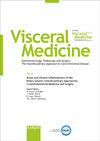Occult and Manifest Colorectal Carcinoma in Ulcerative Colitis: How Does It Influence Surgical Decision Making?
引用次数: 1
Abstract
Background: The incidence of colorectal cancer (CRC) among patients with ulcerative colitis (UC) is increased compared to the general population. The diagnosis of CRC potentially influences surgical decision making in patients with UC. Methods: This review considers clinical studies, systematic reviews, and guidelines on the surgical therapy of CRC in UC. We searched the bibliographic databases The Cochrane Library and Medline (applying MeSH terms such as ‘Colitis, Ulcerative/surgery', ‘Colorectal Neoplasms', and ‘Proctocolectomy, Restorative') with no restriction on language, date, or country. Search results as well as references of relevant publications were independently screened by both authors of this review. Results: The surgical gold standard for proven CRC in UC is oncological proctocolectomy, if possible preferably as a restorative procedure with formation of an ileal pouch-anal anastomosis. Mucosectomy and hand-sewn anastomosis is the preferred option for fashioning the anastomosis in these patients, especially in case of dysplasia or cancer in the rectum, although the available data is not conclusive. In highly selected cases of patients with histologically confirmed sporadic CRC without dysplasia in multiple random biopsies and without relevant inflammation, a conventional limited oncological resection is adequate. If UC patients with rectal cancer require radiotherapy, it should be performed in a neoadjuvant setting because of the high risk of radiation-induced pouch failure. Conclusion: Although restorative proctocolectomy is clearly the gold standard therapy for patients with CRC in UC, surgical decision making has to take into account the various settings and patient factors.溃疡性结肠炎的隐蔽性和显性结直肠癌:如何影响手术决策?
背景:溃疡性结肠炎(UC)患者中结直肠癌(CRC)的发病率比一般人群增加。结直肠癌的诊断可能影响UC患者的手术决策。方法:本文综述了UC中结直肠癌手术治疗的临床研究、系统综述和指南。我们检索了文献数据库Cochrane Library和Medline(使用MeSH术语,如“结肠炎,溃疡性/外科”、“结直肠肿瘤”和“直结肠切除术,恢复性”),没有语言、日期或国家限制。检索结果和相关出版物的参考文献均由本综述的两位作者独立筛选。结果:UC中结直肠癌的手术金标准是肿瘤直结肠切除术,如果可能,最好作为回肠袋-肛门吻合术形成的恢复性手术。在这些患者中,特别是在直肠发育不良或癌症的情况下,尽管现有的数据尚无定论,但粘膜切除术和手缝吻合术是形成吻合口的首选方法。在多次随机活检组织学证实的散发性结直肠癌患者中,没有异常增生且没有相关炎症,常规的有限肿瘤切除术是足够的。如果UC患者合并直肠癌需要放射治疗,则应在新辅助环境下进行,因为放射引起的袋衰的风险很高。结论:虽然恢复性直结肠切除术显然是UC结直肠癌患者的金标准治疗,但手术决策必须考虑各种情况和患者因素。
本文章由计算机程序翻译,如有差异,请以英文原文为准。
求助全文
约1分钟内获得全文
求助全文

 求助内容:
求助内容: 应助结果提醒方式:
应助结果提醒方式:


